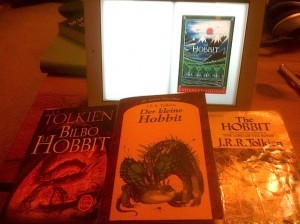As every Tolkien fan on the Net knows, we’ve just had ourselves the first glorious new Hobbit trailer! Between this and getting the beautiful, beautiful Blu-Rays of the extended editions of The Lord of the Rings, I am very, very much in a Tolkien mood now.
Those of you who have been with me since 2004 or so (on LJ) may remember that I’ve had this German edition of The Hobbit for some time. Now that I also have a French edition, not to mention the shiny new enhanced ebook edition of the book on my iPad, I decided that it’s high time to enjoy a re-read of the story. And because I’m feeling ambitious, I’m doing it in three languages at once! With these editions!
Mind you, it ain’t like I expect to really understand much of either the French or the German–that’s why I’ve got the English text handy. I want to go through the translated editions mostly to just get a sense of the rhythm of the language in each, and to see what things I do actually comprehend at first glance, or with judicious consultation of my French or German verb books or dictionaries.
Here are things I’ve observed going through Chapter 1: An Unexpected Party!
First of all, if you happen to have a tablet-type device, a Kindle Fire or a Nook Color or Nook Tablet or an iPad, and you’re a Tolkien fan and into reading ebooks, the enhanced ebook version of The Hobbit has already paid its admission price for me on the strength of lovely embedded illustrations AND audio of Tolkien himself singing the Chip the Glasses Crack the Plates song. It’s the English version I’m using for this adventure, too, given that my paperback edition, the one that dates all the way back to my sixth grade year in school, is quite crinkly about the edges and I don’t want it to fall apart.
Second, it’s quite fun seeing variations in character names. In German, Bilbo is ‘Bilbo Beutlin’ and Bag-End is ‘Beutlinsend’. In French, his mother is ‘Belladonne Took’. in German, she is ‘Belladonna Tuk’. Gandalf is of course the same, as are the names of all the dwarves, though Thorin’s other name renders as ‘Eichenschild’ in German, and it is NOT changed in French. I’m also intrigued to note that in the French edition, Thorin, Balin, and Dwalin are all spelled ‘Thorïn’, ‘Balïn’, and ‘Dwalïn’.
I am also however noting that in the French edition, several names that remain rendered in English are also getting marked with footnotes that point down to French translations. ‘Bullroarer’ (i.e., Bilbo’s wonderful ancestor Bullroarer Took!) has a footnote translating his name as ‘Taureau mugissant’. On the other hand, in German, he is ‘Stierbrüller’!
Third, the real fun here for me is to see what differences I can catch between the English and the other languages. I’ve already spotted one paragraph where the French translator rearranged paragraph structure a bit, and another part where I had to actually pause and look up a verb–thereby learning that ‘We are met’ renders in French as ‘Nous nous sommes réunis’. Meanwhile, in German, I have mad love for the words ‘Drachenfeuer’ and ‘Zwergenpersönlichkeit’, just because German is so very, very good at smooshing shorter words together into big gigantic words.
I’m finding it a bit confusing following the French notation for quotation marks, though. I’m seeing several occurrences where a paragraph starts off with a bit of dialogue, then breaks for a tag or other small bit of narrative–and the quotation marks aren’t closed. I’m seeing both German and French using the « » style of quotation marks, but in French, I’m also seeing several uses of m-dashes to start off dialogue. What’s particularly confusing to me is when the notations are mixed, like this: — Bien sûr ! » dit Bilbo.
Re: the songs, I note that the aforementioned Chip the Glasses song rhymes a lot better in German than it does in French. However, the translators clearly didn’t try to make the Misty Mountains song rhyme in either language. And what’s particularly fun is trying to figure out how either song might be sung in those languages, since in both cases there are a lot more syllables involved and the scansion would therefore be quite different.
Last but most assuredly not least, it must be noted that I am totally hearing all of Gandalf’s dialogue in the voice of Ian McKellen, and I cannot wait to hear Bilbo’s lines uttered by Martin Freeman!

